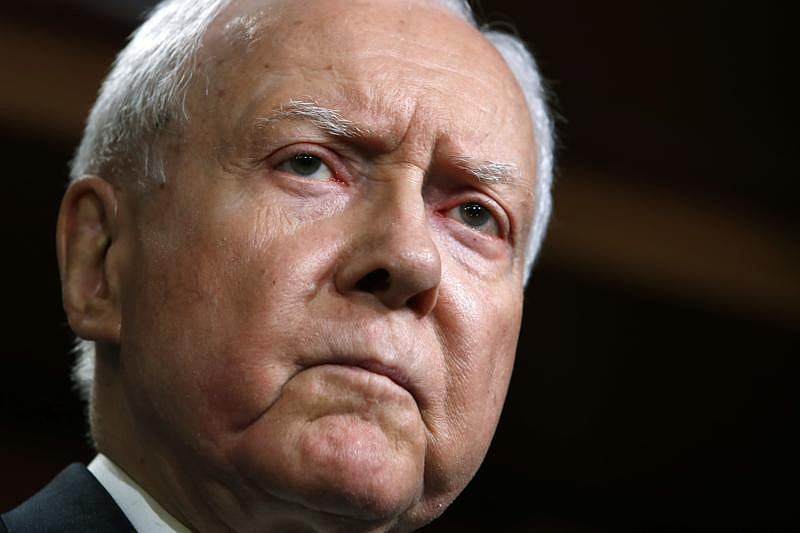Orrin G. Hatch, the longest-serving Republican senator in history who was a fixture in Utah politics for more than four decades, died Saturday at age 88.
His death was announced in a statement from his foundation, which did not specify a cause.
A staunch conservative on most economic and social issues, he also teamed with Democrats several times during his long career on issues ranging from stem cell research to rights for people with disabilities to expanding children’s health insurance. He also formed friendships across the aisle, particularly with the late Democratic Sen. Edward M. Kennedy.
Hatch also championed GOP issues like abortion limits and helped shape the U.S. Supreme Court, including defending Justice Clarence Thomas against sexual harassment allegations during confirmation hearings.
He later became an ally of Republican President Donald Trump, using his role as chairman of the powerful Senate Finance Committee to get a major rewrite of the U.S. tax codes to the president’s desk.
In return, Trump helped Hatch deliver on a key issue for Republicans in Utah with a contentious move to drastically downsize two national monuments that had been declared by past presidents.
An ardent conservative, Hatch favored corporate tax cuts, limited government, deregulation and military spending during his time in office. He consistently voted against gay rights, abortion and stricter gun laws; he reached across the aisle on issues including AIDs education and stem cell research as well as the DREAM Act.
As the ranking Republican on the Senate finance committee, Hatch ushered in the 2017 Tax Cuts and Job Act during the Trump administration, which was lauded as the biggest tax code change in three decades and criticized for favoring corporations and the wealthy.
Hatch also drew criticism for helping then-President Donald Trump dismantle the Bears Ears and the Grand Staircase-Escalante national monuments in Utah.
Born into poverty in the Great Depression, one of nine children of a Pittsburgh metal worker, Mr. Hatch, who briefly aspired to the presidency and to a seat on the Supreme Court, had a grim Dickensian childhood. He went to school in bib overalls, lost siblings in infancy and in World War II, and grew up in a crowded, ramshackle house without indoor plumbing.
In law school, he, his wife and children lived in a chicken coop that he and his father rebuilt behind his parents’ home.
“We turned it into a tiny two-room bungalow, with a toilet and small stove, that we nicknamed ‘the cottage,’ a description that would have made even the most aggressive real estate agent cringe,” he said in a memoir, “Square Peg: Confessions of a Citizen Senator” (2002).
But in the Senate, as in his early life, he was a fighter. Through shrewd political instincts and a fine-tuned sense of the national mood moving to the right, he became a powerful Washington political force, advising seven presidents, shaping some 12,000 pieces of legislation as a sponsor or co-sponsor, and helping to build and hold a conservative majority on the Supreme Court for years.
In a 42-year tenure that began weeks before Jimmy Carter became president in 1977 and ended as his last term drew to a close in early 2019, Mr. Hatch was one of the Senate’s best-known leaders, as familiar to many Americans as anyone on Capitol Hill. He conferred at the White House with Presidents Carter, Reagan, George Bush, Bill Clinton, George W. Bush, Barack Obama and Donald J. Trump, and voted to confirm 10 justices of the Supreme Court.
While unquestionably conservative, there were times Hatch differed from many of his conservative colleagues — including then-President George W. Bush when Hatch pushed for federal funding of embryonic stem cell research.
In 1997, Hatch joined Kennedy in sponsoring a $24 billion program for states to provide health insurance to the children of low-income parents who don’t qualify for Medicaid.
He became a strong opponent of President Barack Obama’s 2009 health care law after pulling out of early bipartisan talks on the legislation. At one point, he said of the legislation: “It is 2,074 pages long. It is enough to make you barf.”
Hatch faced a tough re-election battle from a conservative candidate in 2012, two years after a tea party wave carried longtime Utah Republican Sen. Bob Bennett out of office. Both Bennett and Hatch voted in favor of a 2008 bank bailout that rankled those on the far right.
Hatch poured about $10 million into his 2012 race and worked to build support among tea party conservatives.
In 1982, he held off challenger Ted Wilson, the Democratic mayor of Salt Lake City, to win a second term by a solid margin.
He was never seriously challenged again.
Orrin Grant Hatch was born in 1934 in Pittsburgh, to a carpenter and plaster lather. He married Elaine Hanson in 1957 and graduated from Brigham Young University in 1959. He received a law degree from the University of Pittsburgh in 1962 and was a partner in the law firm of Thomson, Rhodes and Grigsby in that city until 1969. Later, he was a partner in the Salt Lake City firm of Hatch & Plumb.
His six children are Brent, Marcia, Scott, Kimberly, Alysa and Jess.
(with inputs from AP)





